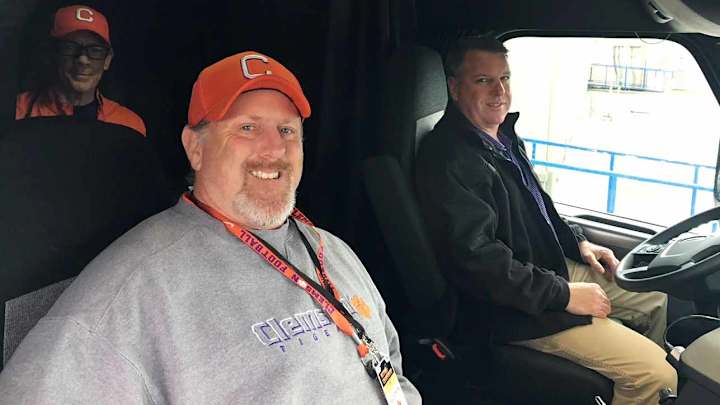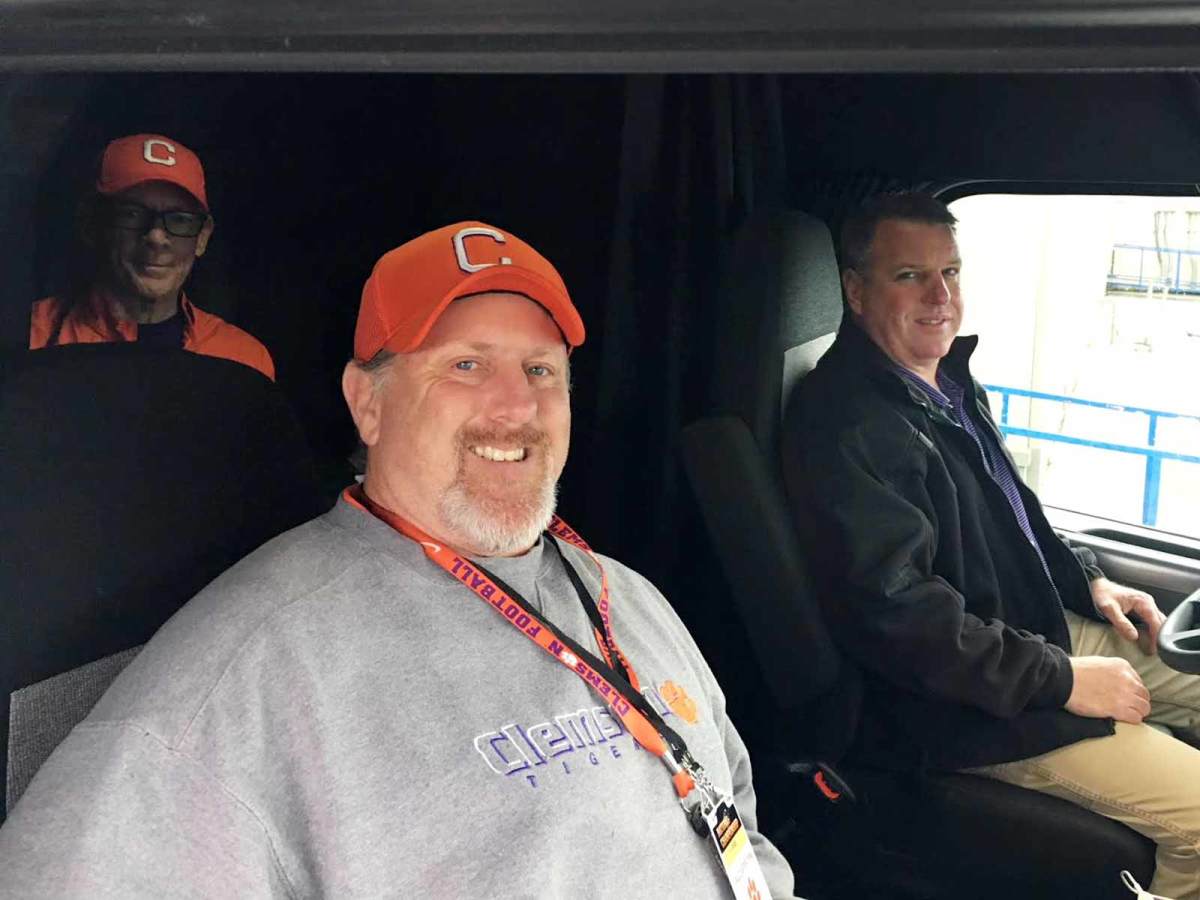No One Had a Longer Haul to the National Title Game Than Clemson's Equipment Truck

SAN JOSE, California — Ray Lewis, a 46-year-old game warden, obtained a commercial driver’s license a few years ago as a way to begin operating dump trucks, a side job for a little extra money to support his wife and two children. He never thought he’d be driving the Clemson football team’s 53-foot tractor trailer, loaded with precious orange-colored equipment and gear, some 2,700 miles across the country. But here he is, behind the wheel of said truck on a rainy Saturday, stationed in a northern California parking lot while the Tigers practice for Monday’s championship game against Alabama. A coast-to-coast trip west is complete, and the trip home awaits .
He’s not alone, of course. In the passenger seat is 49-year-old Mike Brown, a Clemson native and city worker, and in the bunk bed within the truck’s cab is Marion Bridges, a 65-year-old lifelong Tigers fan who drives busses for a living. The trip from Clemson to Santa Clara takes three drivers, each in a rotation behind the wheel for 43 consecutive hours of driving. They spent about $1,000 in fuel charges, crossed through eight states, only made about six pit stops, ran through an ice storm near Dallas and hit a snowstorm in, of all places, Arizona. “We drove through Tuscaloosa, too,” Brown says with a laugh. “We didn’t stop.”
Expert Picks: Who Will Win the National Championship?
The undefeated Crimson Tide and Tigers meet on Monday night just south of San Francisco, multiple time zones away from the region of the country that has asserted its dominance this season. Ticket demand for the championship game is the lowest in years, according to multiple secondary marketplaces. Some individual game tickets were selling for as cheap as $170 as of Sunday afternoon, and thousands of tickets remained for sale on sites like StubHub. Could there be empty seats at Levi’s Stadium for the sport’s pinnacle event? Even Clemson athletic director Dan Radakovich says selling the school’ allotment of 20,000 tickets required some creative advertising, and College Football Playoff executive director Bill Hancock admits this distant destination is behind the ticket issues. “People have had trouble getting out here,” Hancock says. “We get that, but when we started the playoff, we wanted to move the championship game around. We’ve been successful at that. First 10 championship games, each will be in a different city. We want to take college football to different parts of the country.”
The attendance and apathy storylines have enveloped the event, dark clouds hanging over what’s supposed to be a celebration of college football. If anyone can attest to just how far this trip is, it is Lewis and his truckmates. Of the thousands of fans journeying west, this Clemson trio had one of the more fascinating treks. “All they did was stop for fuel, switch drivers and go to the bathroom,” says Abe Reed, Clemson’s head equipment manager. “I really appreciate what they do.”
Especially since they aren’t paid. At Clemson, equipment bus drivers are volunteers. These guys don’t view it like that. They receive a daily food per diem, free rooms at ritzy resorts and tickets to the game. “I got people back home that say, ‘Why in the world are you doing that for free?’” Lewis says. “It’s really not for free.” Bridges estimates this trip to California is worth about $5,000.

Their route here followed a snaking path. They departed Clemson at 2:30 p.m. Tuesday, took Interstate 20 through Atlanta and Dallas, hit I-10 in west Texas, drove through Phoenix, looped around Los Angeles on I-220 and then took I-5 for the final leg up California, arriving in Santa Clara on Thursday morning. They drive in cycles, each behind the wheel for six- to eight-hour shifts while the other two nap, either in the cab’s bunk or in a cushy, reclining passenger seat.
Bridges got the privilege of starting out the journey with a 10-hour trek into Texas, and Brown drove through the ice storm west of Dallas. Lewis, third in the rotation, was the one who drove through snowy Arizona. Meanwhile, back at Clemson, Reed received text-message updates from the trio. There are issues from time to time. Earlier this season, a flat tire set the drivers back about three hours. “Usually, no news is good news,” Reed says with a smile.
For the drivers, this a dream. Brown grew up so close to Clemson’s football stadium he could hear the band marching down the hill, and Bridges has been a fan since birth. He is a professional bus driver in Brevard, N.C., about an hour north of Clemson. For years, as a fan, he’d see the orange busses pull up to the football stadium and wonder if he’d ever get that shot. Nine years later, it happened, although it did take some convincing. “I told them, I’ll drive anywhere you want,” Bridges recalls. “I’ll drive the Taliban to the White House if you’ll just let me drive the Clemson football bus. It’s been a dream job.”
LITMAN: Clemson Seniors Aren’t Tired of Ending Every Year Against Alabama
They are unsung, unpaid heroes of the football team, responsible for essential cargo: clothing for coaches, player uniforms, cleats and even administrative knick-knacks. “They are fans with special talent,” Radakovich says. In return, they receive a close-up view of their favorite team. Bridges also drives the offensive team bus for home games, transporting players to the team hotel, to a movie each Friday night and to Memorial Stadium on Saturday. He’s gotten to know a handful of players and assistants. “It amazes me they’ll have a conversation with a 65-year-old man,” he laughs. “When I was that age, did I want anything to do with a 65-year-old guy? These are very polite kids. You get a little relationship during the season, get to know them.”
The three go their separate ways when the season is over, only to be reunited the next year. They’ve only been driving together for two seasons. Lewis is the newest, joining the group in 2017. “We’re all adults, easy-going, good personalities,” Lewis says. “Like a lot of the same things. I’m sure I get on their nerves, but by and large, it’s good.” Privacy is hard to find in a space the size of a small bathroom. Bridges will sometimes bury himself in the bunk and pull the black curtain separating it from the front two seats, or he might put on headsets and close his eyes, hoping to doze off. Wives call from time to time, as wives do. There’s no need for privacy. In fact, Bridges clicks his phone on speaker for all to hear. “It’s not like we talk sexy to our wives or anything,” Lewis says. “You say what you gotta say and get off the phone.”
What else do the drivers do in this tiny cab during a 43-hour trip? They snack. Brown opens the cab’s cupboard to reveal packages of peanut butter and jelly sandwiches, cans of peanuts, bags of chips and the most precious food on the trip: deer jerky, made by Lewis. They listen to music, either FM radio or Spotify. Last week, during the 15-hour haul from Arlington back to Clemson after the Cotton Bowl, they tuned in to Alabama’s win over Oklahoma. By the end of this two-week adventure, they’ll have rolled up more than 7,500 miles, including the trip to Dallas and back. It’s a lot of driving broken up by small naps, eating gas station food and restroom breaks in some unsavory locations, but it’s worth it, they say, whether it’s a six-hour drive to Tallahassee for an ACC regular season game or a cross-country haul for the national championship game. Bridges, the most diehard Clemson fan of the trio, smiles. “I was coming anyway.”
